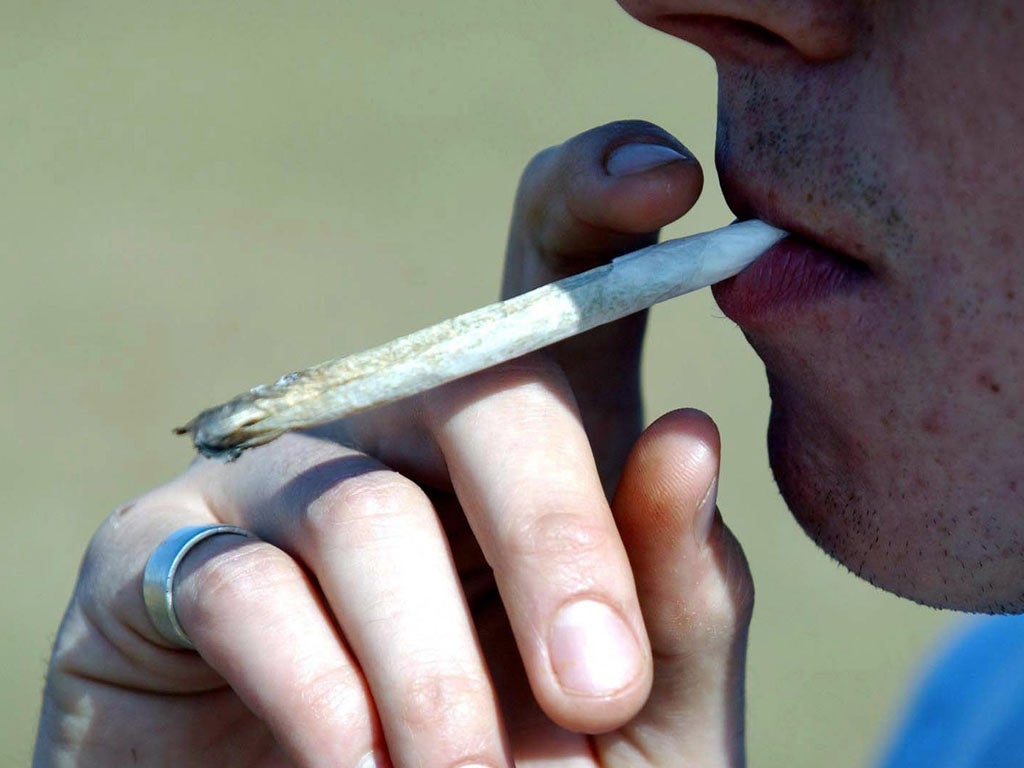Young cannabis users 'do not realise the huge danger to their health'
Drug carries 20 times the cancer risk of a plain tobacco cigarette – yet 88 per cent believe it is safer

Your support helps us to tell the story
From reproductive rights to climate change to Big Tech, The Independent is on the ground when the story is developing. Whether it's investigating the financials of Elon Musk's pro-Trump PAC or producing our latest documentary, 'The A Word', which shines a light on the American women fighting for reproductive rights, we know how important it is to parse out the facts from the messaging.
At such a critical moment in US history, we need reporters on the ground. Your donation allows us to keep sending journalists to speak to both sides of the story.
The Independent is trusted by Americans across the entire political spectrum. And unlike many other quality news outlets, we choose not to lock Americans out of our reporting and analysis with paywalls. We believe quality journalism should be available to everyone, paid for by those who can afford it.
Your support makes all the difference.Cannabis smoking poses a 20-times greater risk of lung cancer per cigarette than tobacco smoking yet most users of the drug are unaware of its dangers, a report says today.
The UK's most popular illicit recreational drug is used by more than a third of people under 24, but 88 per cent believe it is less dangerous than tobacco. One in three said it did not harm health, despite research linking it to respiratory, circulatory and psychiatric problems.
The British Lung Foundation, which commissioned the survey, said the findings were "alarming".
"New research continues to reveal the multiple health consequences of smoking cannabis, [yet] there is still a dangerous lack of public awareness of quite how harmful this drug can be," said Dame Helena Shovelton, BLF chief executive.
"Young people in particular are smoking cannabis unaware that each cannabis cigarette they smoke increases their chances of developing lung cancer by as much as an entire packet of 20 tobacco cigarettes." She called for a public health campaign to "dispel the myth that smoking cannabis is somehow a safe pastime".
The reason why cannabis is more dangerous than tobacco, per cigarette, is thought to be related to the way it is smoked. Cannabis smokers inhale more deeply and hold it longer than tobacco smokers.
The average puff on a cannabis joint is two-thirds larger and is held four times longer than the average puff of a tobacco cigarette. As a result, the cannabis smoker inhales four times as much tar and five times as much carbon monoxide. In addition, with each puff of a joint the smoke particles become more concentrated and more harmful.
Cannabis smoking has been linked with a wide range of respiratory problems, while the concentration of tetrahydrocannabinol (THC) – the drug's psychoactive ingredient – has doubled since the 1990s, according to analysis of samples from police seizures. THC has been linked to an increased heart attack risk and suppression of the immune system.
Concern has also focused on the drug's impact on mental health, particularly on a small group of vulnerable users with an inherited predisposition to schizophrenia.
Critics say most cannabis users give up in their 30s, limiting their long-term exposure, which is a crucial factor in cigarette-induced lung cancer. Two long-term studies of the drug involving more than 100,000 people in Sweden and the US found no increase in deaths. Unlike tobacco, cannabis does not contain nicotine and so is not addictive.
However, the generation that grew up in the 1960s was the first to use cannabis on a large scale and is too young to have been followed into old age, so the long-term effects of the drug are still not known.
New York city to soften marijuana law
The public possession of a small amount of marijuana may soon elicit little more than a slap on the wrist in New York under a partial decriminalisation plan unveiled this week by Governor Andrew Cuomo.
The draft law, which is backed by New York City Mayor Michael Bloomberg, is partly a response to concerns that the existing law, which requires an arrest and the filing of a criminal misdemeanour charge, disproportionately affects young Hispanics and blacks.
Civil rights advocates have long charged the police of racial profiling when applying stop-and-frisk tactics to individuals.
The change will also relieve the workload of the police who handled 50,000 such cases last year. "It becomes a question of balance," Mr Cuomo said of the practice. "Part of the balance is the relationship with the community. I think the NYPD and the mayor are making efforts to work with the community." Under the new law, possession of 25 grams of marijuana will become a violation instead of a criminal charge. Violators will no longer be arrested but fined $100.
David Usborne
Join our commenting forum
Join thought-provoking conversations, follow other Independent readers and see their replies
Comments